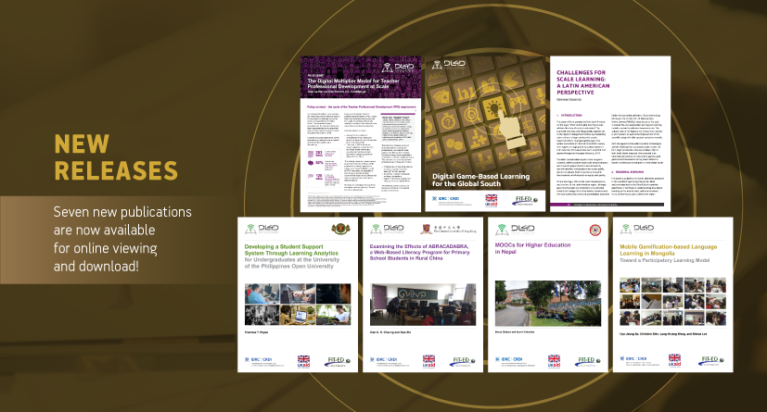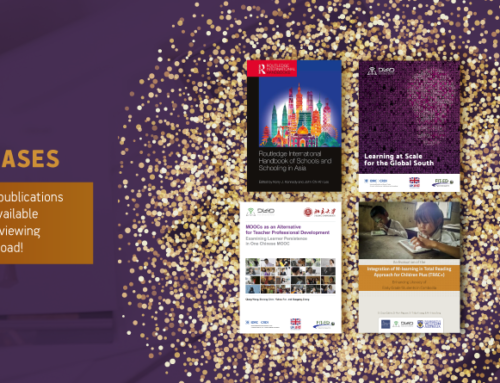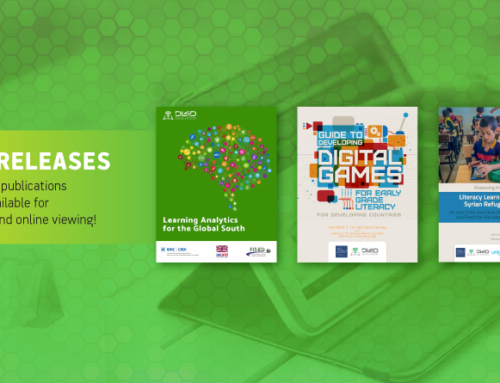NOW AVAILABLE – Read and download the latest DL4D publications:
- An estimated 69 million more teachers are needed by 2030 to meet the scale of the educational challenges across the world, and especially in the Global South. Using current models of teacher professional development (TPD), it would take many decades simply to generate the quality of teaching professionals needed for universal basic education that can achieve good learning outcomes. Written by Diana Laurillard and Eileen Kennedy of the University College of London (UCL) Knowledge Lab, Policy Brief: The Digital Multiplier Model for Teacher Professional Development at Scale argues for the redesign of the current multi-tier cascade face-to-face model into a single-tier online “digital multiplier” model: i.e., using large-scale online courses or MOOCs to provide TPD directly to local teachers, supported in local face-to-face groups. The policy brief pushes for innovative pedagogic design by teachers in addition to digital infrastructure development. In general, it is argued that any intervention must take a holistic and systemic approach to addressing local conditions.
- In “Challenges for Scale Learning: A Latin American Perspective,” German Escorcia Saldarriaga (Mexico) offers a response to Laurillard, Kennedy, and Wang’s “How Could Digital Learning at Scale Address the Issue of Equity in Education?” part of the compilation of papers entitled, Learning at Scale for the Global South. He highlights issues around cost, sustainability, and appropriate learning and teaching models, and underscores the importance of teachers and teacher professional development.
- Digital Game-Based Learning for the Global South is a compilation of papers that examine how DGBL could be optimized as an educational innovation in the Global South. The main paper, “The Potential of Digital Game-Based Learning for Improving Education in the Global South,” by Chris Dede discusses ways to improve quality, equity, and efficiency in teaching and learning by building capacity on four dimensions: context-sensitive DGBL design; technology infrastructure; teacher competencies; and research. Farzana Ahmad (Pakistan) and Chin-Chung Tsai in “Digital Game-Based Learning: A South Asian Perspective,” consider the importance of shifting the mindset of teachers, leadership, and policymakers alike; designing bilingual games that consider the local context; developing comprehensive teacher-proof games coupled with constructive feedback and embedded assessments; fostering collaboration between governments, research centers, the game industry, the telecom industry, and the social sector; and conducting longitudinal research in the South Asian context to further investigate DGBL’s effectiveness and implementation.
- In Examining the Effects of ABRACADABRA, a Web-Based Literacy Program on Primary School Students in Rural China, a study by Alan C.K. Cheung and Guo Xin, around 360 third grade students from 10 schools in Hunan, China participated in a year-long matched control study to measure the effects of ABRACADABRA (or A Balanced Reading Approach for Children Always Designed to Achieve Best Results for All), a web-based literacy learning program developed by the Centre for the Study of Learning and Performance at Concordia University. The study found that ABRA is particularly effective for Primary 3 Chinese ESL students in Hunan in terms of the development of phonological, phonemic, and early literacy skills. The study also reaffirmed that teacher training is critical in the implementation process, and that ABRA’s success hinges on the professional development of teachers.
- In MOOCs for Higher Education in Nepal, Manoj Shakya and Sushil Shrestha of Kathmandu University created and piloted a massive open online course (MOOC) on basic programming–the first MOOC to be developed and delivered locally–to explore the prospects and challenges of offering MOOCs in Nepal. The study found that digital literacy among students and teachers is high. Students and teachers expressed a strong willingness to participate in digital learning in general, and MOOCs in particular. Administrators were also positive about implementing and supporting the MOOC movement in their respective institutions, noting that the lack of expertise to teach specific courses can be addressed with the help of MOOCs.
- Developing a Student Support System Through Learning Analytics for Undergraduates of the University of the Philippines Open University by Charisse T. Reyes uses learning analytics to identify the factors affecting student success in the Associate in Arts program of the University of the Philippines Open University. Data from various sources were obtained for the analysis of demographic information, previous academic experiences, learner readiness for distance education, and students’ learning behavior. The study proposes the development of a student support system based on the characteristics and attributes of learners as well as their academic behaviors. This student support system aims to promote students’ success in the AA program.
- In Mobile Gamification-based Language Learning in Mongolia: Toward a Participatory Learning Model, Hyo-Jeong So, Christine Shin, Lung-Hsiang Wong, and Shinae Lee designed a participatory language learning model that incorporated gamification, social media, and mobile devices, which they implemented in three public schools in Ulaanbaatar. This report presents the trajectory and key findings from the one-year research implementation. Overall, this research demonstrates that the potential of adopting and sustaining digital learning innovations in Mongolian public schools can be enhanced when the solution leverages upon existing resources and cultural practices, and when continuous efforts are made to build local teachers’ pedagogical knowledge and skills.








